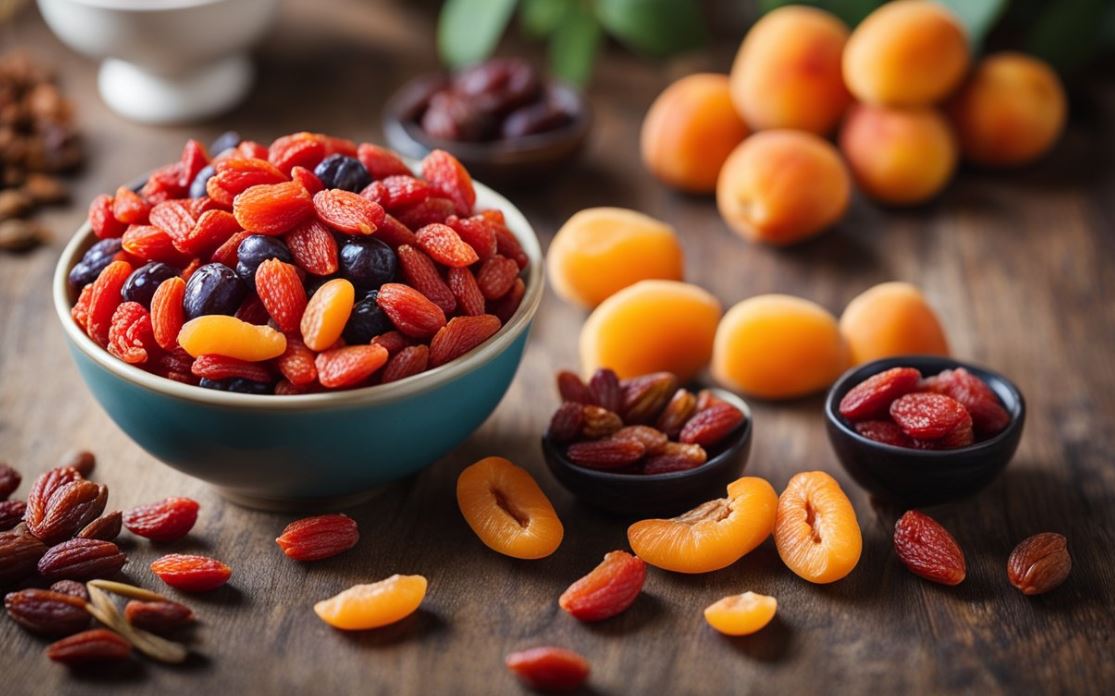The Best Fluffy Pancakes recipe you will fall in love with. Full of tips and tricks to help you make the best pancakes.

8 Dried Fruits With Amazing Health Benefits
Dried fruits are a great alternative to fresh fruits, especially when they are out of season. They are packed with nutrients and can be enjoyed as a snack or added to various dishes. In this article, we will explore 8 dried fruits that offer amazing health benefits.

First on the list is apricots. Dried apricots are a good source of fiber, potassium, and vitamins A and E. They are also rich in antioxidants that protect the body against damage from free radicals. Apricots have been linked to improved digestion, bone health, and eye health.
Next up are figs. Dried figs are high in fiber, calcium, and iron. They also contain antioxidants that help fight inflammation and disease. Figs have been shown to improve digestion, lower blood pressure, and promote healthy skin. Stay tuned to learn about more dried fruits with amazing health benefits.
Nutritional Profiles of Dried Fruits

Dried fruits are a great source of essential nutrients and vitamins. Here are some of the nutritional profiles of 8 dried fruits with amazing health benefits:
Apricots
Apricots are a good source of Vitamin A, potassium, and fiber. They are also high in antioxidants, which help protect cells from damage caused by free radicals.
Dates
Dates are a good source of fiber, potassium, and iron. They are also high in antioxidants and have been shown to improve brain function.
Figs
Figs are a good source of fiber, potassium, and calcium. They are also high in antioxidants and have been shown to improve heart health.
Prunes
Prunes are a good source of fiber, Vitamin A, and potassium. They are also high in antioxidants and have been shown to improve bone health.
Raisins
Raisins are a good source of fiber and iron. They are also high in antioxidants and have been shown to improve digestion.
Cranberries
Cranberries are a good source of Vitamin C and fiber. They are also high in antioxidants and have been shown to improve urinary tract health.
Blueberries
Blueberries are a good source of Vitamin C and fiber. They are also high in antioxidants and have been shown to improve brain function.
Cherries
Cherries are a good source of fiber and Vitamin C. They are also high in antioxidants and have been shown to improve sleep quality.
Overall, dried fruits are a great addition to a healthy diet. They are a convenient and tasty way to get essential nutrients and vitamins.
Dates: Natural Sweetness and Fiber-Rich

Dates are one of the most popular dried fruits, known for their natural sweetness and chewy texture. They are packed with essential nutrients that can provide numerous health benefits.
One of the most significant benefits of dates is their high fiber content. Fiber is essential for maintaining digestive health and preventing constipation. A single serving of dates (about 3-4 dates) can provide up to 3 grams of fiber, which is about 12% of the recommended daily intake.
Dates are also a rich source of antioxidants, which can help protect the body against oxidative stress and inflammation. Antioxidants can also help reduce the risk of chronic diseases, such as heart disease, cancer, and diabetes.
In addition, dates are a good source of potassium, magnesium, and calcium, which are essential minerals for maintaining bone health and regulating blood pressure.
Overall, dates are an excellent addition to any diet, providing a natural source of sweetness and essential nutrients. They can be enjoyed as a snack on their own or used as a natural sweetener in recipes such as smoothies, baked goods, and sauces.
| Nutrient | Amount per Serving |
|---|---|
| Fiber | 3 g |
| Potassium | 167 mg |
| Magnesium | 18 mg |
| Calcium | 15 mg |
Note: Nutrient values are based on a serving size of 3-4 dates.
Prunes: Bone Health and Digestion

Prunes, also known as dried plums, are a great source of fiber, vitamins, and minerals. They are often used as a natural laxative due to their high content of sorbitol, a sugar alcohol that helps regulate bowel movements.
In addition to their digestive benefits, prunes are also good for bone health. They contain high levels of vitamin K and potassium, which are essential for maintaining strong bones and preventing osteoporosis.
One serving of prunes (about 5-6 dried fruits) contains approximately 3 grams of fiber, which can help lower cholesterol levels and improve digestion. Prunes are also a good source of antioxidants, which can help protect the body against damage from free radicals.
To incorporate prunes into your diet, try adding them to oatmeal or yogurt for breakfast, or using them as a natural sweetener in baked goods. Just be sure to watch your portion sizes, as prunes are high in calories and can lead to weight gain if consumed in excess.
Apricots: Eye Health and Antioxidants

Apricots are a delicious and nutritious dried fruit that are a great source of fiber, vitamins, and minerals. They are also packed with antioxidants that help protect the body against damage from harmful free radicals.
One of the key health benefits of apricots is their ability to support eye health. They are rich in vitamin A, which is essential for maintaining good vision. Vitamin A helps protect the eyes from age-related macular degeneration and cataracts, two common eye conditions that can lead to vision loss.
In addition to their eye health benefits, apricots are also a good source of other antioxidants such as vitamin C and beta-carotene. These antioxidants help protect the body against damage from free radicals, which can cause cell damage and lead to chronic diseases such as cancer, heart disease, and Alzheimer’s disease.
Apricots are also a good source of potassium, which is important for maintaining healthy blood pressure levels. They are also a good source of fiber, which helps promote digestive health and can help lower cholesterol levels.
Overall, apricots are a delicious and nutritious dried fruit that offer a variety of health benefits. They are particularly beneficial for eye health and are a great source of antioxidants that help protect the body against damage from free radicals.
Raisins: Energy Source and Dental Health

Raisins are dried grapes that are packed with nutrients. They are a great source of energy and provide numerous health benefits. Here are some of the benefits of eating raisins:
- Energy source: Raisins are a great source of carbohydrates, which are essential for providing energy to the body. They contain natural sugars that can give an instant energy boost.
- Dental health: Raisins contain phytochemicals that can help fight bacteria that cause cavities and gum disease. They also stimulate the production of saliva, which helps to neutralize the acid in the mouth.
- Rich in antioxidants: Raisins are rich in antioxidants such as phenolic acids and flavonoids. These antioxidants help to protect the body from damage caused by free radicals.
- High in fiber: Raisins are a good source of dietary fiber, which helps to promote digestive health and prevent constipation.
- Low in fat and cholesterol: Raisins are low in fat and cholesterol, making them a healthy snack option for people who are watching their weight or trying to maintain a healthy heart.
Overall, raisins are a healthy and nutritious snack that can provide numerous health benefits. They are easy to store, and can be added to a variety of dishes such as oatmeal, salads, and trail mix.
Figs: Calcium and Potassium Content

Figs are a sweet and delicious dried fruit that are packed with essential nutrients. They are an excellent source of calcium and potassium, which are important minerals for maintaining strong bones and healthy blood pressure levels.
A 100-gram serving of dried figs contains approximately 162 milligrams of calcium, which is about 16% of the recommended daily intake for adults. Calcium is essential for building and maintaining strong bones and teeth, as well as for proper muscle and nerve function.
In addition to calcium, dried figs are also a rich source of potassium, with a 100-gram serving containing approximately 680 milligrams of this essential mineral. Potassium is important for regulating blood pressure levels, as well as for proper muscle and nerve function.
Including dried figs in your diet can be a great way to boost your intake of these important minerals. They can be enjoyed as a snack on their own, or added to salads, oatmeal, or other dishes for a sweet and nutritious boost.
Goji Berries: Immune System Boost

Goji berries are a nutrient-dense fruit that has been used in traditional Chinese medicine for centuries. They are known for their immune-boosting properties due to their high antioxidant content.
Antioxidants protect the body from free radicals that can damage cells and lead to chronic diseases. Goji berries are rich in antioxidants such as zeaxanthin, lutein, and beta-carotene. These antioxidants help to boost the immune system by fighting off harmful bacteria and viruses.
In addition to their immune-boosting properties, goji berries are also a good source of fiber, vitamins A and C, iron, and potassium. These nutrients help to improve digestion, promote healthy skin, and support heart health.
Goji berries can be enjoyed as a snack on their own, added to trail mix, or used in smoothies and baked goods. They are also available in supplement form for those who prefer a more concentrated dose of their health benefits.
Overall, incorporating goji berries into a balanced diet can provide a tasty way to boost the immune system and support overall health.
| Nutrient | Amount per 100g |
|---|---|
| Fiber | 13g |
| Vitamin A | 7,000 IU |
| Vitamin C | 48mg |
| Iron | 9mg |
| Potassium | 1,132mg |
Note: 100g of goji berries is approximately 1 cup.
Cranberries: UTI Prevention and Vitamin C
Cranberries are a popular dried fruit that are packed with health benefits. They are low in calories and high in nutrients like fiber, vitamin C, and antioxidants. One of the most well-known benefits of cranberries is their ability to prevent urinary tract infections (UTIs).
UTIs are common bacterial infections that affect the urinary system, including the bladder, ureters, and kidneys. Cranberries contain compounds called proanthocyanidins, which can prevent bacteria from sticking to the walls of the urinary tract. This makes it harder for bacteria to cause infections, reducing the risk of UTIs.
In addition to preventing UTIs, cranberries are also an excellent source of vitamin C. Vitamin C is an essential nutrient that plays a vital role in many bodily functions, including immune system health, collagen production, and wound healing.
Here are some key nutritional facts about dried cranberries:
| Nutrient | Amount per 1/4 cup |
|---|---|
| Calories | 123 |
| Total fat | 0.5 g |
| Sodium | 1 mg |
| Total Carbohydrates | 33 g |
| Dietary Fiber | 2 g |
| Sugars | 26 g |
| Protein | 0.1 g |
| Vitamin C | 5% of the Daily Value |
Overall, cranberries are a delicious and nutritious dried fruit that can provide numerous health benefits. Incorporating them into your diet can help prevent UTIs and boost your vitamin C intake.



